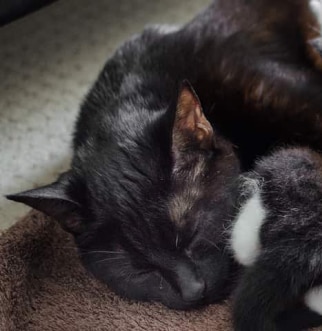Pet Care Centre
Get the latest pet stories, news, tips and advice right here.
Sort & Filter
638 results
sort by

"Why Is My Dog Constipated?" and Other Gastrointestinal Questions
Read More
10 Fun Ways Cats Wake Up Their Owners
Read More
10 Important Health Tips for Senior Cats
Read More
10 Tips to Prepare for Adopting a Dog
Read More
3 Easy-to-Make DIY Enrichment Toys for Dogs
Read More
3 Ideas for Exercising Older Dogs
Read More
3 Steps to Prepare Your Apartment For a Dog
Read More
3 Steps to Transitioning Your Cat to a New Pet Food
Read More
5 Ideas for Indoor Exercise for Dogs
Read More
5 New Fun Things to Do With Your Cat
Read More
5 Signs You Have a Spoiled Dog
Read More
6 Signs of Aging in Cats
Read More
7 Everyday Dog Health Tips
Read More
8 Common Health Problems in Senior Dogs
Read More
A Guide for Choosing the Best Cat Carrier
Read More
A Guide to Trimming Cat Claws
Read More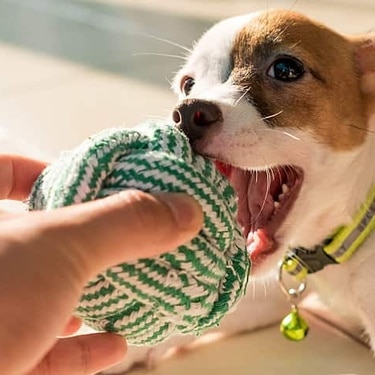
A Quick and Easy Guide to Cleaning Dog Toys
Read More
A few ground rules
Read More
A purrfect coat for your kitten
Read More
Abyssinian
Read More
Adolescent puppies can be challenging
Read More
Adopting Two Dogs at Once: Key Considerations
Read More
Adopting an Adult Cat | Hill's Pet
Read More
Affenpinscher
Read More
Afghan Hound
Read More
Airedale Terrier
Read More
Akbash Dog
Read More
Akita
Read More
Alaskan Klee Kai
Read More
All About Dog Zoomies!
Read More
All you need to know about neutering
Read More
Allergic Dermatitis
Read More
American Eskimo Dog
Read More
American Water Spaniel
Read More
Antioxidants in Pet Food: Why They're Important to Your Pet's Diet
Read More
Are Bananas Safe for My Cat?
Read More
Are Carrots Good for Dogs? What You Need to Know
Read More
Are Cats Protective of Their Humans?
Read More
Are Dogs Really Colour Blind?
Read More
Are Grapes & Raisins Bad for Dogs?
Read More
Are Tomatoes Bad for Dogs? What You Need to Know
Read More
Are cats trainable? | Hill's Pet
Read More
Are your Dog’s Bad Habits Stomach Churning?
Read More
Arthritis in Dogs: What You Need to Know
Read More
Arthritis in Your Cat: Signs, Causes & Treatment
Read More
Australian Cattle Dog
Read More
Australian Shepherd
Read More
Avoiding joint problem flare-ups can be as easy as A-B-C!
Read More
Balanced Dog Foods & When to Change Them
Read More
Balinese
Read More
Basenji
Read More
Basset Hound
Read More
Beagle
Read More
Bearded Collie
Read More
Beauceron
Read More
Bedlington Terrier
Read More
Behaviour training for your puppy
Read More
Belgian Malinois
Read More
Belgian Sheepdog
Read More
Belly Upset: Soothing Your Cat's Sensitive Stomach
Read More
Benefits of Neutering Your Dog
Read More
Benefits of Neutering a Cat
Read More
Benefits of Soy in Your Pet's Food
Read More
Bengal
Read More
Bernese Mountain Dog
Read More
Best Dog Food: The Inside Scoop
Read More
Bichon Frise
Read More
Birman
Read More
Black And Tan Coonhound
Read More
Blood in Cat Stool: Should You Be Concerned?
Read More
Blood in Dog Urine: What Should You Do?
Read More
Bombay
Read More
Border Collie
Read More
Brain Ageing in Dogs: Symptoms & Treatment
Read More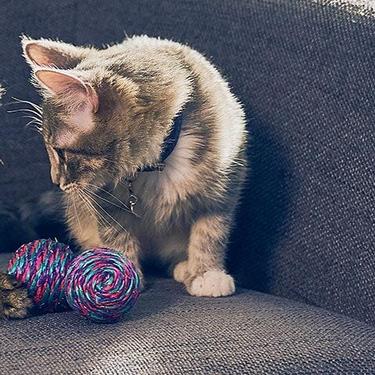
Bringing Home Your First Kitten
Read More
Bringing Home Your First Kitten
Read More
Bringing your puppy home
Read More
British Shorthair
Read More
Brushing & Food: Keys to Maintaining Your Cat's Oral Health
Read More
Building a Dog Park in Your Own Backyard
Read More
Burmese
Read More
Burmilla
Read More
Buying Pet Supplies Online While Self-Isolating
Read More
COVID-19 highlights the need for increased emotional support
Read More
Can Cats Eat Cheese?
Read More
Can Cats Get the Flu or a Cold?
Read More
Can Cats Have Allergies?
Read More
Can Cats See TV?
Read More
Can Dogs & Cats Have Avocados? (& Are They Safe?)
Read More
Can Dogs & Cats Have Avocados? (& Are They Safe?)
Read More
Can Dogs Be Vegan?
Read More
Can Dogs Catch a Cold or Get the Flu?
Read More
Can Dogs Eat Broccoli? (and Is It Safe?)
Read More
Can Dogs Eat Cheese?
Read More
Can Dogs Eat Peanut Butter?
Read More
Can Dogs Eat Watermelon?
Read More
Can Dogs Understand Humans?
Read More
Can Dogs and Cats Be Friends? | Hill's Pet
Read More
Can Dogs and Cats Eat Ham?
Read More
Can My Dog Eat Pizza?
Read More
Can My Dog or Cat Catch Coronavirus Disease COVID-19?
Read More
Can cats see in the dark?
Read More
Cancer in Dogs: Causes, Diagnosis & Treatments
Read More
Caring for Your Deaf Dog: Communication and Safety Tips
Read More
Caring for Your Dog: Common Myths & Realities
Read More
Caring for your kitten's new teeth | Hill's Pet
Read More
Caring for your puppy's teeth
Read More
Cat & Mouse: Why Your Cat Likes to Catch Them
Read More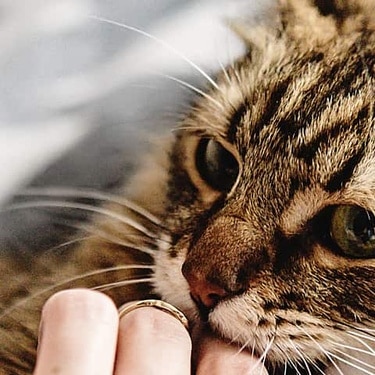
Cat Aggression: How to Calm Them Down
Read More
Cat Allergic Dermatitis: Causes & Treatments
Read More
Cat Anxiety: Understanding Your Stressed Cat
Read More
Cat Bullying: What It Is & How to Stop It
Read More
Cat Colitis: Causes, Signs and Treatment
Read More
Cat Constipation: Signs and Causes
Read More
Cat Dementia: More Than "Just Getting Old"
Read More
Cat Ear Emotions: How Cat Ears Move With Their Mood
Read More
Cat Ear Infections: Symptoms, Diagnosis, Treatment & Prevention
Read More
Cat Exercise and Workout Tips | Hill's Pet
Read More
Cat Food Puzzles: How They Benefit Your Cat
Read More
Cat Jumping? How to Keep Her Paws on the Ground
Read More
Cat Leukemia: Symptoms, Testing and Prevention
Read More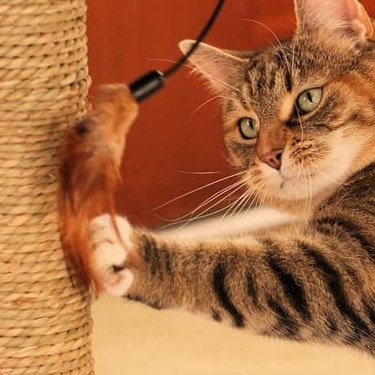
Cat Life Hacks: Making Life Easier for You and Your Cat
Read More
Cat Life Stages: Providing the Best Care for Your Cat at Any Age
Read More
Cat Mobility 101: Managing Cat Joint Health
Read More
Cat Play: How to Keep Your Kitty Engaged
Read More
Cat Poop: A Comprehensive Guide
Read More
Cat Training: How to Train Your Cat the Easy Way
Read More
Cat Travel Checklist for Going on Holiday with Your Cat
Read More
Cat Weight Management
Read More
Cat and baby | Hill's Pet
Read More
Cat treats are a fun subject for you and your cat!
Read More
Cats & Tuna: Is it Safe for Them?
Read More
Cats Need Good Nutrition In Order To Stay Healthy
Read More
Cats and Christmas Trees: How to Keep Both Safe
Read More
Cats and changing Weather
Read More
Cats and children
Read More
Causes of Dog Vomit and What They Mean
Read More
Change a Bored Dog into a Playful Dog with These 6 Games
Read More
Changing Cat Food: How to Do It Safely
Read More
Charting Your Kitty's Development
Read More
Chartreaux
Read More
Choosing a vet for your dog
Read More
Choosing the Best Toys for Your Dog
Read More
Choosing the right veterinarian for your cat
Read More
Cleaning Your Dog's Paws: Tips for Success
Read More
Clever Ways to Keep Your Cat Active: Food Scavenger Hunts
Read More
Clipping Dog Nails for Puppy Pedicures
Read More
Cocker Spaniel
Read More
Common Cat Myths & Misconceptions: Get the Feline Facts - Hill's Pet
Read More
Common Dog Sayings and Their Origins
Read More
Common Dog Surgery Questions: Procedures, Anaesthesia, Rehab & More
Read More
Common Health Concerns in an Overweight Cat
Read More
Common Mistakes Dog Owners Shouldn't Make | Hill's Pet
Read More
Cornish Rex
Read More
Cover me in sunshine: Mood boosting advice to help rid the winter blues
Read More
Crate Training an Older Dog: What You Need to Know
Read More
Cymric
Read More
DIY Cat Stain & Odor Remover That Actually Works
Read More
Dachshund
Read More
Dalmatian
Read More
Dangerous festive Plants to Avoid for Your Cat
Read More
Dealing With Dog Mange
Read More
Dealing With a Dog Peeing on the Lawn
Read More
Dealing with Tapeworms in Cats
Read More
Dealing with dog fleas
Read More
Dental Care for Your Dog
Read More
Dental Disease in Dogs: Symptoms & Treatment
Read More
Develop Your Gut Instinct for Pets’ Digestive Disorders
Read More
Devon Rex
Read More
Diabetes in Cats: Causes, Signs & Treatments
Read More
Diabetes in Dogs: What You Need to Know
Read More
Diet Considerations for Pregnant & Nursing Cats
Read More
Differences Between Male and Female Cats
Read More
Digestive disorders are one of the most common reasons for consulting a vet
Read More
Distemper in Dogs: Symptoms, Diagnosis & Treatment
Read More
Do Cats Fart?
Read More
Do Cats Knock Things Over on Purpose?
Read More
Do Cats Like to Be Petted?
Read More
Do Cats Really Have Nine Lives?
Read More
Do Cats Understand Mirrors?
Read More
Do Cats Understand Words?
Read More
Do Dogs Feel Guilt or Shame?
Read More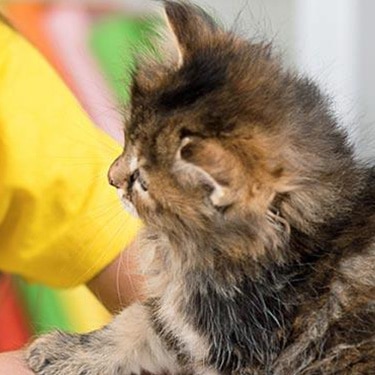
Do I Have Time for a Dog?
Read More
Doberman
Read More
Does More Protein Mean a Healthier Dog and Cat Food?
Read More
Does My Dog Like to be Petted?
Read More
Does Shaving a Pet for Summer Keep Them Cooler?
Read More
Does dry nose mean sick dog?
Read More
Does your dog have a sensitive stomach?
Read More
Dog Bitten by a Snake? Clinical Symptoms & What You Should Do
Read More
Dog Breeds That Don't Shed: A Guide for People with Allergies
Read More
Dog Depression: How to Tell If Your Dog Has the Blues
Read More
Dog Genetics: Nutrigenomics and the Power of Epigenetics
Read More
Dog Interaction
Read More
Dog Like to Swim? Activities for Your Water-Loving Pup.
Read More
Dog Not Pooping or Peeing?
Read More
Dog Rabies: Symptoms, Transmission to Humans & Vaccinations
Read More
Dog Scooting & Recognising Anal Gland Problems
Read More
Dog Tail Signs: What That Wagging Means
Read More
Dog and new baby…getting along famously
Read More
Dogs & Table Food: Why to Avoid Feeding Them Scraps | Hill's Pet
Read More
Dogs With Joint Problems Don't Have to Remain in Pain
Read More
Dogs afraid of thunder
Read More
Dogs in heat
Read More
Early Training
Read More
Easter for Pets: How to Celebrate a Fun and Safe Holiday
Read More
Eating Dog Poo
Read More
Egyptian Mau
Read More
English Foxhound
Read More
English Pointer
Read More
English Setter
Read More
English Springer Spaniel
Read More
Essential Oils for Cats: Are They Safe?
Read More
Everything You Ever Wanted to Know About Dog Poop
Read More
Excessive Thirst in Dogs: Common Causes & When to See the Vet
Read More
Exercise Tips to Keep Your Dog Active
Read More
Extinguishing Heat Exhaustion in Cats
Read More
Facts about Kidney Disease in Dogs
Read More
Fats
Read More
Features to Look For in the Best Dog Harness
Read More
Feeding fish to cats
Read More
Feeding your kitten: some food for thought
Read More
Feeding your puppy
Read More
Feline Urinary Tract Diseases & Infections: Facts & Nutritional Tips
Read More
Feline Urinary Tract Diseases & Infections: Facts & Nutritional Tips
Read More
Festive Foods to Avoid Giving Your Dog
Read More
Field Spaniel
Read More
Finding A Lost Dog: What Should You Do?
Read More
Fireworks without fear
Read More
First aid tips
Read More
First three months
Read More
Five Most Intelligent Dog Breeds
Read More
Five tips to help train your puppy
Read More
Five tips to stop cats from scratching up the furniture | Hill's Pet
Read More
Flat-coated Retriever
Read More
Fleas and worms
Read More
Flying with your dog
Read More
Foods that are Dangerous or Toxic to Cats
Read More
Free of hairballs
Read More
Frozen & Fun Dog Treats for Hot Summer Days
Read More
Fun DIY Beds for Your Cat
Read More
Fun Games for Exercising Your Cat
Read More
Fun Ideas for Kids and Pets This Summer
Read More
Gastrointestinal Disorders
Read More
German Shepherd
Read More
German Wirehaired Pointer
Read More
Get into the habit of dog fitness
Read More
Getting Rid of Pet Hair Around the House
Read More
Getting Your Cat Into Her Carrier
Read MoreGiving a Cat a Bath: A How-To Guide
Read More
Golden Retriever
Read More
Great Dane
Read More
Great Pyrenees
Read More
Great ways to Pamper & Spoil your dog
Read More
Grooming your puppy
Read More
Guía de Frutas y Verduras que Pueden Comer los Perros
Read More
Hairballs: The Trouble With Fur
Read More
Havana Brown
Read More
Health problems you can't vaccinate against
Read More
Healthy Dog Treats You Can Make at Home
Read More
Healthy Homemade Cat Treat Recipes
Read More
Healthy Homemade Cat Treat Recipes
Read More
Healthy skin and a healthy coat
Read More
Heart Disease and Conditions in Dogs: Causes & Facts
Read More
Heart Disease in Your Cat: How Nutrition Can Help
Read More
Heat Exhaustion in Dogs Signs Your Dog Is Overheating
Read More
Help! My Dog Won't Go Outside When It's Raining
Read More
Help, my Pet has an Upset Stomach!
Read More
Helpful Tips for Walking Your Dog
Read More
Helping Your Cat Adapt to Cold Winter Temperatures
Read More
Helping Your Cat Lose Weight: Food & Exercise Tips
Read More
Helping Your Cat Overcome Fears of Thunder & Fireworks
Read More
Helping Your Cat Recover from Serious Illness or Accidents
Read More
Helping Your Dog Recover From Accidents & Surgery
Read More
Helping a New Dog's Anxiety After Coming Home
Read More
Helping people with companion dogs | Hill's Pet
Read More
Helping your puppy to socialise
Read More
Hilarious Reasons We’re All Thankful for Our Pets This Year
Read More
Hip Dysplasia in Dogs: Causes, Symptoms, & Treatment
Read More
Hiring a Dog Walker: Is It the Right Decision for You?
Read More
Holding out for a hero
Read More
How Can I Stop My Dog From Chewing?
Read More
How Cats Show Affection to Their Humans
Read More
How Dogs Show Affection for Their Owners After Long Absences
Read More
How Food Allergies Can Affect Your Dog
Read More
How Often Should You Bathe Your Dog?
Read More
How Proper Dog Oral Care Leads to Healthy Dog Teeth
Read More
How To Feed a Cat With a Sensitive Stomach
Read More
How To Support Your Cat’s Digestion
Read More
How To Tell If Your Cat Has A Skin Condition
Read More
How a Cat’s nutritional needs differ from ours?
Read More
How a dog’s nutritional needs differ from ours?
Read More
How and When To Feed Your Mature Cat?
Read More
How and When to Start Training a Puppy or Kitten
Read More
How and when to feed your Dog?
Read More
How do I stop my dog barking?
Read More
How to Be the Best New Dog Parent
Read More
How to Care for Cat Paw Pads
Read More
How to Care for Terminally Ill Pets
Read More
How to Choose the Best Dog and Cat Names
Read More
How to Clean Cats Ears: A Comprehensive Guide
Read More
How to Clean Dog Ears
Read More
How to Get Dog Pee Smell Out of Carpet
Read More
How to Give a Dog a Pill: Helpful Tips & Methods
Read More
How to Handle Cat Spraying
Read More
How to Handle Dogs That Dig
Read More
How to Identify & Remove a Tick From a Cat
Read More
How to Keep Dogs Safe (and Cool) in Summer Weather
Read More
How to Live With Cat Allergies
Read More
How to Make DIY Cat Shelves
Read More
How to Make Vet Visits Less Scary for Your Dog
Read More
How to Make Your Own Dog Obstacle Course
Read More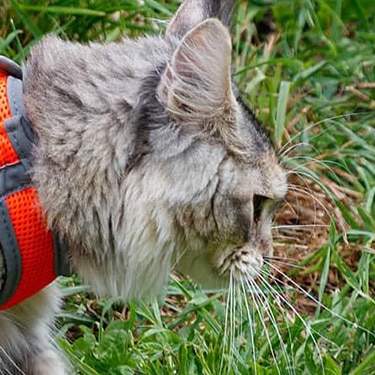
How to Put On a Cat Harness
Read More
How to Read a Pet Food Label
Read More
How to Repurpose Old Kids' Toys Into Toys for Your Pup
Read More
How to Stop Pet Separation Anxiety: Five Helpful Tips
Read More
How to Take Your Dog Or Cat's Temperature
Read More
How to Talk to Cats (and Are They Really Listening?)
Read More
How to Teach a Cat to Fetch | Hill's Pet
Read More
How to groom and bath your cat
Read More
How to groom and bath your dog
Read More
How to reprimand your cat
Read More
How to say Happy Holidays to your dog - without the weight gain
Read More
How to speak your pet’s love language this month of love
Read More
Human Foods That Are Dangerous for Your Dog
Read More
Hydrotherapy for Dogs
Read More
Hyperthyroidism in Cats: Warning Signs, Management & Treatment
Read More
Hypothyroidism in Dogs: Symptoms, Diagnosis & Treatment
Read More
Ibizan Hound
Read More
Identification for your puppy
Read More
Identifying & Preventing Separation Anxiety in Your Dog
Read More
Importance of DHA in your Pet's Food
Read More
Important Information on FLUTD & Urinary Tract Infections in Cats
Read More
Important Information on Food Allergies & Intolerance in Your Cat
Read More
Introducing a new cat to current pets
Read More
Introducing kitten to a cat
Read More
Introducing the collar and lead
Read More
Irish Setter
Read More
Irish Water Spaniel
Read More
Irish Wolfhound
Read More
Is Chocolate Bad for Cats?
Read More
Is Corn Bad for Pets?
Read MoreIs Hand Sanitizer Bad for Dogs? (& What to Do if They Eat it)
Read More
Is It Safe to Give My Dog or Cat Fruit?
Read More
Is My Cat Overweight?
Read More
Is My Dog Mad at Me?
Read More
Is My Dog Sick? How Can I Tell?
Read More
Is My Dog Too Skinny?
Read More
Is My Dog's Sneezing Normal?
Read More
Is My Pet Gay?
Read More
Is Your Cat Hiding Her Pain? Recognising the Signs & Symptoms.
Read More
Is Your Cat Hiding Her Pain? Recognizing the Signs & Symptoms.
Read More
Is catnip safe for my cat?
Read More
Is chocolate poisonous to dogs?
Read More
Is it Safe to Feed My Dog a Banana?
Read More
Is your garden safe for your puppy?
Read More
Jack Russell Terrier
Read More
Japanese Bobtail
Read More
Just How Smart Are Cats?
Read More
Keeping Older Dogs Young: How to Encourage Vitality
Read More
Keeping Your Cat Hydrated if She's Not Drinking Water
Read More
Keeping your kitten close to home
Read More
Keeping your kitten well groomed
Read More
Keeping your pets happy and healthy during the winter
Read More
Keeping your puppy healthy
Read More
Keeping your puppy safe at home
Read More
Kidney Disease in Dogs: Causes, Signs & Treatments
Read More
Kitten Proofing Your Home with 10 Easy-to-Follow Tips
Read More
Kitten Teething: Age Timeline, Signs & How You Can Help
Read More
Kitten psychology
Read More
Kitten to senior cat food: cat nutrition by lifestage
Read More
Know Your Cat Health Basics
Read More
Knowing Your Cat's Special Anatomy
Read More
Labrador Retriever
Read More
Learning through play
Read More
Leaving a Cat Home Alone: How Long is Safe?
Read More
Letting Your Dog Sleep in the Bed
Read More
Liver Disease in Dogs
Read More
Liver Disease in Your Cat: Causes, Signs & Symptoms
Read More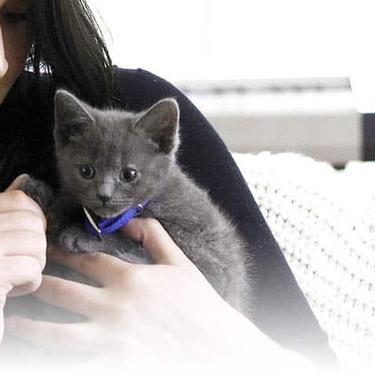
Looking after your kitten’s welfare
Read More
Lymphoma in Cats: What You Need to Know
Read More
Maine Coon
Read More
Maltese
Read More
Managing Cat Diarrhoea: Causes, Symptoms & Treatment
Read More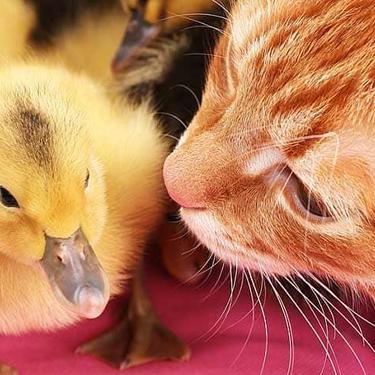
Managing Cats Around Your Smaller Pets
Read More
Managing Clingy Cats: Do I Have a Velcro Kitty?
Read More
Managing Dog Hot Spots and Acral Lick Granulomas
Read More
Managing Your Cat's Nocturnal Behaviour
Read More
Managing Your Dog's Farts & Gas Problems
Read More
Managing Your Dog's Seasonal Allergies
Read More
Managing Your Dogs Congestive Heart Failure
Read More
Managing your puppy around a female puppy in season
Read More
Managing your puppy when she is in season
Read More
Manx
Read More
Mast Cell Tumours in Dogs: Causes, Appearance, Treatment & More
Read More
Meal Feeding vs. Free Feeding Cats: What's Best?
Read More
Meet the vet
Read More
Meet the vet
Read More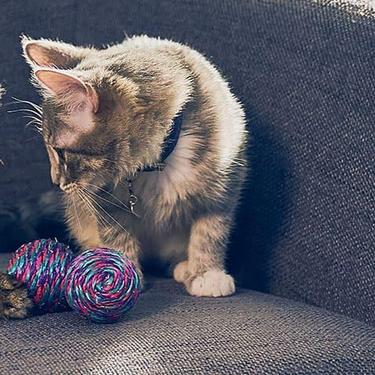
Meeting The Housemates
Read More
Mental health is a universal right
Read More
Microchipping
Read More
Microchipping: The Facts
Read More
Microchipping: The Facts | Hill's Pet
Read More
Minerals
Read More
Miniature Schnauzer
Read More
Mixing Cats and Holidays: Tips for a Safe Season
Read More
Mixing Wet and Dry Pet Food Properly
Read More
Mixing pet foods
Read More
My Cat Ate String: Dangers, What to Do & Treatments
Read More
My Cat Hates My Dog: What Should I Do?
Read More
My Child Wants a Puppy... What Do I Do?
Read More
My Dog Ate Soap: What Should I Do?
Read More
My Dog Sleeps All Day: Is That Normal?
Read More
My Dog is Acting Lethargic: Causes & How to Help
Read More
My Dog is Getting Old: What Accessories Does He Need?
Read More
My cat is a fussy eater
Read More
My cat's nose is dry. Should I be concerned?
Read More
New Kitten Checklist: How To Give Your Kitten The Best Start
Read More
Newborn Puppy Care: 5 Things You Need to Know
Read More
Newfoundland
Read More
Norwegian Elkhound
Read More
Norwegian Forest Cat
Read More
Nutrition For Healthy Pet Skin and Coat
Read More
Nutritional Requirements From Puppy to Elder Dog Years
Read More
Odd Behaviours of Dogs: Running in Their Sleep and More
Read More
Odd Behaviours of Dogs: Running in Their Sleep and More
Read More
Office Dogs Can Lower Stress & Bond Employees
Read More
Oriental
Read More
Overweight Cat? Slim Down with These Activities
Read More
Pancreatitis In Cats: Signs, Causes And Treatment
Read More
People with allergies and dogs
Read More
Persian
Read More
Pet Food Storage Tips
Read More
Pet Home Alone: Back to School's Effect on Your Pet
Read More
Pet Nutrition And Behaviour
Read More
Pet Supply Storage: 8 Upcycling Crafts for Bags and Cans
Read More
Pets play an important role in mental health support
Read More
Playing with Your Cat on a Budget: 7 Totally Free Games
Read More
Playing with your cat | Hill's Pet
Read More
Playing with your dog
Read More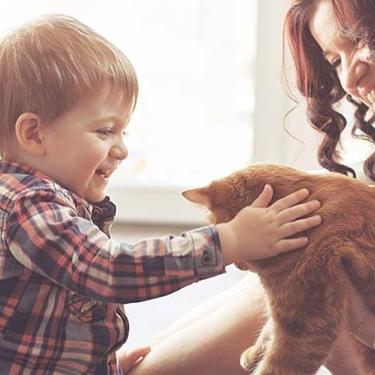
Playtime with children
Read More
Poodles
Read More
Portuguese Water Dog
Read More
Predictive Biology: The Science Behind Our Pet Food
Read More
Pregnancy in cats
Read More
Pregnancy in dogs
Read More
Preparing Your Nervous Cat for Large Gatherings at Home
Read More
Preventing Growth Disorders in Dogs
Read More
Proteins
Read More
Puppies don't come with a set of instructions
Read More
Puppy Timeline: How Puppies Grow & Develop To Be Dogs
Read More
Puppy psychology
Read More
Rabies: Facts, not Fear
Read More
Ragdoll
Read More
Raising a Puppy: What You Need to Know
Read More
Reading Dog Food Reviews: What You Need to Know
Read More
Reasons Why You Should Microchip Your Pets | Hill's Pet
Read More
Reasons for Your Cat Vomiting
Read More
Reasons to Adopt a Senior Dog
Read More
Recognizing Common Signs of Aging in Your Dog
Read More
Recognizing and Managing Dog Dementia
Read More
Reducing Holiday Party Stress for Your Dog
Read More
Relocating with your cat
Read More
Rhodesian Ridgeback
Read More
Ring in the New Year with These Pet Resolutions
Read More
Rottweiler
Read More
Safety Tips for Dogs & Open Car Windows
Read More
Saint Bernard
Read More
Seasonal Advice
Read More
Senior Cat Problems: What You Should Know About Aging Cats
Read More
Separation-Anxiety
Read More
Sharing a Bed with Your Cat: Steps for Success
Read More
Show Your Love And Exercise Your Dog
Read More
Siamese
Read More
Siberian Husky
Read More
Sickness and Diarrhoea: Is it an emergency?
Read More
Signs That Your Cat is Grieving & How You Can Help
Read More
Signs of good health
Read More
Simple Ways to Keep Your Senior Cat Moving
Read More
Six Ways to Socialise Your New Cat
Read More
Skin Cancer in Dogs: Symptoms, Diagnosis & Early Detection
Read More
Skin Lumps on a Cat: Types, Causes & Treatment
Read More
Skin Problems to Watch For in Your Cat
Read More
Small Dog Breeds: What You Need to Know
Read More
Somali
Read More
Spot the Signs of Aging in Your Pet | Hill's Pet
Read More
Stamping out aggressive behaviour
Read More
Stamping out bad behaviour
Read More
Start scratching right
Read More
Steps to Successfully House Train Your Puppy
Read More
Strange Behaviours You've Probably Noticed in Your Dog
Read More
Stress and Feline Urinary Problems: How to Deal With It
Read More
Stress in Dogs: Causes, Symptoms & Finding Relief
Read More
Subtle Signs that Your Cat is Aging
Read More
Suggestions for Grooming & Bathing Your Cat
Read More
Suggestions to Make Your Cat Drink from a Bowl
Read More
Summer Heat
Read More
Taking your Dog to the Veterinarian
Read More
Taking your cat to the vet
Read More
Teaching Your Dog to Fetch
Read More
Teaching Your Puppy: Obedience Training Basics
Read More
Teaching an Old Dog New Tricks: A Guide for Senior Training
Read More
Techniques for Obedience Training Your Kitten
Read More
The Best Holiday Gifts for Pets
Read More
The Challenges of Walking Your Dog in Winter
Read More
The Elderly and Their Pets: Forming a Special Bond
Read More
The Facts Behind Clinically Proven Dog Food
Read More
The History of "Fighting Like Cats and Dogs"
Read More
The Importance of Exercise for Your Puppy
Read More
The Meaning Behind Your Cat's Meow: 5 Distinct Cat Sounds & Noises
Read More
The Right Diet For Your Pet
Read More
The Science Behind Your Dog and His Behaviour
Read More
The Science Behind a Dog IQ Test
Read More
The Truth About Cats And Milk
Read More
The leader of the pack - your puppy or you?
Read More
The pick of the litter | Hill's Pet
Read More
The right food for your kitten
Read More
The risks of excessive salt intake
Read More
The science of healing
Read More
The tales the cat tail tells
Read More
Tiffany
Read More
Time apart
Read More
Tips & Advice for Making Your House Safe for a Cat
Read More
Tips & Methods for Switching Dog Foods
Read More
Tips For Mixing Wet And Dry Pet Food
Read More
Tips for Creating Your Cat's Own Social Media Account | Hill's Pet
Read More
Tips for Feeding Two Dogs at Once
Read More
Tips for Giving Your Cat Pills & Medications
Read More
Tips for Leaving Your New Dog Home Alone
Read More
Tips for Socialising Your Kitten with People & Other Pets
Read More
Tips for Taking Your Dog on a Vacation
Read MoreTips for Working From Home With a Pet
Read More
Tips for being a purrfect new cat parent
Read More
Tips for the First Few Weeks with Your New Puppy
Read More
Toilet training your kitten | Hill's Pet
Read More
Top 3 Funny Cat Quirks You Should Know
Read More
Top Cat Pet Peeves: What Cats Hate
Read More
Toxic houseplants
Read More
Training Tips: Dog Impulse Control
Read More
Training Two Puppies: How to Succeed
Read More
Transportation and travelling
Read More
Travelling with your cat
Read More
Travelling with your kitten
Read More
Travelling with your puppy
Read More
Treat your cat for life – not just for Christmas
Read More
Treat your dog for life – not just for Christmas
Read More
Treat your pet for life – not just for Christmas | Hill's Pet
Read More
Treats are important
Read More
Turkish Angora
Read More
Types of Cat Litter & How to Choose the Right One
Read More
Types of Cat Litter & How to Choose the Right One
Read More
Typical Health Problems in Small Breed Dogs
Read More
Understanding & Caring For Your Miniature-Breed Dog
Read More
Understanding & Treating Dehydration in Dogs
Read More
Understanding Dog Panting: When Should You Worry?
Read More
Understanding Why My Cat's Stomach Gurgles
Read More
Understanding Your Pet's Microbiome
Read More
Understanding cats in heat
Read More
Understanding your kitten
Read More
Urinary Tract Disease
Read More
Useful Tips for Traveling with Your Puppy
Read More
Using Your Kid's Old Toys as Homemade Cat Toys
Read More
Vaccinating your kitten
Read More
Vaccines Your Kitten Should Have
Read More
Vet Checkups & Blood Work for Senior Cats
Read More
Vet Recommended Pet Food Explained
Read More
Vet's Advice About A Dog Diet
Read More
Veterinary Visits
Read More
Vitamins
Read More
Walking a Cat: Should You Take Your Kitty for a Stroll?
Read MoreWant to Foster Cats? Here's What You Should Know
Read More
Washing Your Dog from Ear to Paw: Eight Supplies to Make It Easy
Read More
Watching your puppy's weight
Read MoreWeight Loss Goals How Your Dog Can Help
Read More
Weight Management for Dogs
Read More
Weight loss and management, proven in the real world
Read More
Weimaraner
Read More
Weird Things Cats Do & Why We Love Them
Read More
Welcoming Your New Kitten: Making Your Kitty Comfortable
Read More
West Highland White Terrier
Read More
What Can I Give My Dog for Pain?
Read More
What Causes Cat and Dog Insomnia?
Read More
What Cleaning Products Are Safe for Pets?
Read More
What Do Cats Dream About?
Read More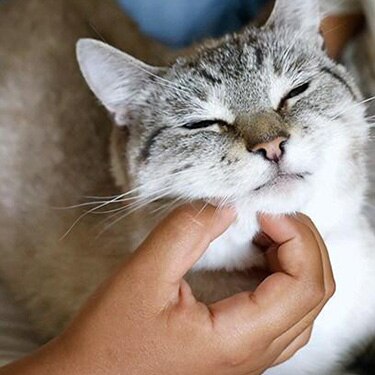
What Is Your Cat’s Gut Microbiome and Why Is It Important?
Read More
What Motivates Your Smart Cat
Read More
What Nutrients Can Help a Pet’s Immune System?
Read More
What Should I Do With My Pet When I Travel?
Read More
What Should I Do for a Dog with a Splinter?
Read More
What You Should Know About Pet Food Calories
Read More
What Your Dog is Trying to Tell You
Read More
What Your Pet Can’t Tell You
Read More
What is My Dog Thinking About?
Read More
What should I do about my overweight dog?
Read More
What to Expect After a Pet Cancer Diagnosis
Read More
What to Expect When Adopting a Three-Legged Pet
Read More
What to Feed Your Pregnant or Nursing Dog
Read More
What's My Dog Doing When I'm Not Home?
Read More
What's your kittens idea of a nice break?
Read More
When Do Cats Stop Growing? Kitten Growth Guide
Read More
When Does My Puppy Become an Adult Dog?
Read More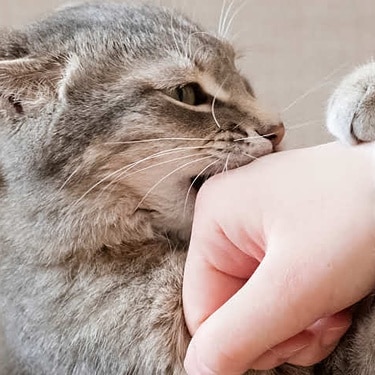
When Does a Cat's Play Aggression Cross the Line?
Read More
When To Start Feeding Kittens Solid Food
Read More
When chewing becomes destructive
Read More
Where to get your puppy from
Read More
Why Are My Dog's Eyes Red?
Read More
Why Cats Like to Pounce
Read More
Why Do Cats Bite While Playing?
Read More
Why Do Cats Eat Grass?
Read More
Why Do Cats Lick Their Paws? Can it Become Excessive?
Read More
Why Do Dogs Hate Baths? (& Tips for Bathing a Scared Dog)
Read More
Why Do Dogs Like Belly Rubs? (And What If My Dog Doesn't?)
Read More
Why Does My Cat Attack My Feet?
Read More
Why Does My Dog Sigh?
Read More
Why Dogs Throw Up After Eating
Read More
Why Is My Cat Itching And Licking So Much?
Read More
Why Is My Cat Limping?
Read More
Why Is My Cat Peeing Blood?
Read More
Why Is My Cat Shaking and Shivering?
Read More
Why Is My Dog Eating Dirt?
Read More
Why Is My Dog Foaming at the Mouth?
Read More
Why Is My Dog Itching?
Read More
Why Is My Dog Shaking? 6 Common Causes for the Shivers
Read More
Why Is My Dog Sitting on Me? Five Possible Reasons
Read More
Why Your Cat Likes to Hide in Small Dark Spaces
Read More
Why Your Dog Should Exercise
Read More
Why Your Dog Should Exercise | Hill's Pet
Read More
Why Your Dog Should Exercise | Hill's Pet
Read More
Why cats won't use litter tray
Read More
Why do Cats Meow?
Read More
Why do dogs eat grass?
Read More
Why does my dog....? Interpreting common dog behaviours
Read More
Why does your puppy bark?
Read More
Why is My Kitten Crying? (& How to Help Them Stop)
Read More
Why is my cat throwing up food after eating?
Read More
Wire Fox Terrier
Read More
Your Cat is Always Hungry: What Should You Do?
Read More
Your Overweigth Cat: When Bigger Isn't Better
Read More
0 results found
Featured Articles by category
After years of research, experts at Hill’s have determined that the gut microbiome affects not only your pet’s digestive health but their overall health.















